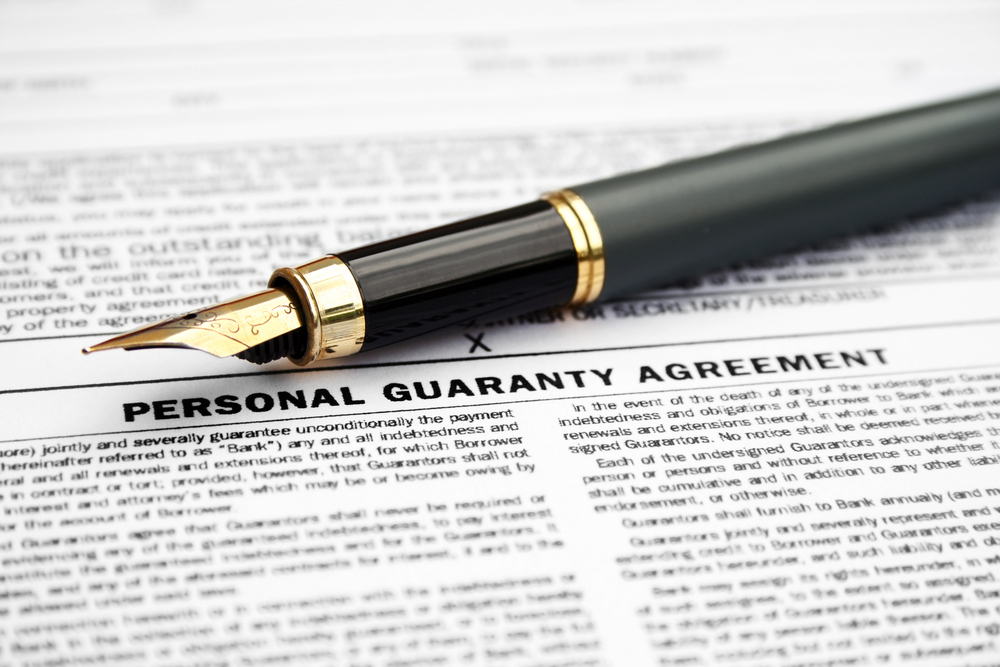
Should You Sign a Personal Guarantee to Secure Financing?
61 percent of small business owners expect to expand their businesses next year, which means many will be in search of capital. They may be required to sign a personal guarantee to secure financing. Here are seven things you need to know about personal guarantees.
Contents
- 1 What is a personal guarantee?
- 2 Why do lenders require a personal guarantee?
- 3 Why is the spouse sometimes required to sign?
- 4 Are all small- or medium-sized businesses required to sign a personal guarantee?
- 5 When should you NOT sign a personal guarantee?
- 6 What does a personal guarantee include?
- 7 What if you sell the business?
What is a personal guarantee?
A personal guarantee is a written promise from a business owner or executive guaranteeing payment on an equipment lease or loan if the business does not pay. It is not tied to a specific asset but can be used to go after the guarantor’s personal assets in case of non-payment.
Why do lenders require a personal guarantee?
Lenders require a personal guarantee as an "added assurance" that the owner or executive is committed to the business and repaying the lease or loan. It demonstrates responsibility and commitment. Generally, any holder of 20% or more of a business’s equity must personally guarantee the lease and loan obligations. Since small- or medium-sized business owners’ personal finances are often intertwined with the business, it is reasonable for lenders to seek this assurance.
Why is the spouse sometimes required to sign?
The spouse is required to sign for the same reasons as the business owner. Their personal finances are often tied to the business as well.
Are all small- or medium-sized businesses required to sign a personal guarantee?
Not all SMBs are required to sign. Exceptions include large, well-established SMBs with revenues exceeding $25 million, public companies registered on a public stock exchange, non-profit companies, venture-backed companies, and businesses structured as ESOPs. However, if a primary bank requires a personal guarantee for a 12-month revolving loan, it is likely that a lessor or lender providing a 3 to 5-year term lease or loan will require it as well due to the higher risk involved.
When should you NOT sign a personal guarantee?
Be cautious about signing a personal guarantee if you are not part of the executive management team and do not have full knowledge of the company’s plans or finances. Consider having a lawyer review the document to ensure clarity.
What does a personal guarantee include?
A personal guarantee declares personal liability for the lease or loan obligations of the business and may also include liability for default interest, legal fees, and other fees.
What if you sell the business?
If you sell your interest in a business, ensure that you get released from the personal guarantee. If you are not properly released, you will still be held liable if the lease or loan goes into default. Paying off the lease may be required as part of the business sale.
Hello!
I’m Andrew Brooks, a seasoned finance consultant from the USA and the mind behind phonenumber247.com.
My career is built on a foundation of helping individuals and businesses thrive financially in an ever-changing economic landscape. At phonenumber247.com, my aim is to demystify the complex world of finance, providing clear, actionable advice that can help you navigate your financial journey with confidence. Whether it’s personal finance management, investment strategies, or understanding the nuances of market dynamics, I’m here to share insights and tools that can propel you towards your financial goals.
Welcome to my digital space, where every piece of advice is a step closer to financial clarity and success!
